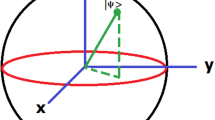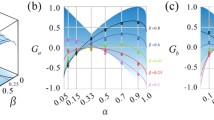Abstract
Lottery is a game in which multiple players take chances in the hope of getting some rewards in cash or kind. In addition, from the time of the early civilizations, lottery has also been considered as an apposite method to allocate scarce resources. Technically, any scheme for lottery needs to be fair and secure, but none of the classical schemes for lottery are unconditionally secure and fair. As fairness demands complete unpredictability of the outcome of the lottery, it essentially requires perfect randomness. Quantum mechanics not only guarantees the generation of perfect randomness, it can also provide unconditional security. Motivated by these facts, a set of strategies for performing lottery using different type of quantum resources (e.g., single photon states, and entangled states) are proposed here, and it’s established that the proposed strategies lead to unconditionally secure and fair lottery schemes. A scheme for semi-quantum lottery that allows some classical users to participate in the lottery involving quantum resources is also proposed and the merits and demerits of all the proposed schemes are critically analysed. It is also established that the level of security is intrinsically related to the type of quantum resources being utilized. Further, it is shown that the proposed schemes can be experimentally realized using currently available technology, and that may herald a new era of commercial lottery.




Similar content being viewed by others
Data availability
Data sharing not applicable to this article as no datasets were generated or analysed during the current study.
Notes
\(\vert \psi ^{\pm } \rangle = \frac{1}{\sqrt{2}} \{ \vert 01 \rangle \pm \vert 10 \rangle \}\) and \(\vert \phi ^{\pm } \rangle = \frac{1}{\sqrt{2}} \{ \vert 00 \rangle \pm \vert 11 \rangle \}\)
References
Blanche, E.E.: Lotteries yesterday, today, and tomorrow. Ann. Am. Acad. Polit. Soc. Sci. 269(1), 71–76 (1950)
Rubner, A.: The Economics of Gambling. Macmillan, London (1966)
Ball, P.S.: Gambling in Elizabethan England: perspectives on England’s ‘Lotterie Generall’ of 1567–69. Ph.D. thesis, University of Tasmania (2018)
Boyce, J.R.: Allocation of goods by lottery. Econ. Inquiry 32(3), 457–476 (1994)
Shaddy, F., Shah, A.K.: When to use markets, lines, and lotteries: how beliefs about preferences shape beliefs about allocation. J. Mark. 86(3), 140–156 (2021)
Stone, P.: Why lotteries are just. J. Polit. Philos. 15(3), 276–295 (2007)
Saunders, B.: The equality of lotteries. Philosophy 83(3), 359–372 (2008)
Eckhoff, T.: Lotteries in allocative situations. Soc. Sci. Inf. 28(1), 5–22 (1989)
Waldspurger, C.A.: Lottery and stride scheduling: flexible proportional-share resource management. Ph.D. thesis, Massachusetts Institute of Technology (1995)
Frankle, J., Carbin, M.: The lottery ticket hypothesis: finding sparse, trainable neural networks. In: International Conference on Learning Representations (2019)
Liu, M., Choy, V., Clarke, P., Barnett, A., Blakely, T., Pomeroy, L.: The acceptability of using a lottery to allocate research funding: a survey of applicants. Res. Integr. Peer Rev. 5, 3 (2020)
Fang, F.C., Casadevall, A.: Grant funding: playing the odds. Science 352(6282), 158–158 (2016)
Adam, D.: Science funders gamble on grant lotteries. Nature 575(7785), 574–575 (2019)
Charles, H.B., Brassard, G: Quantum cryptography: public key distribution and coin tossing. In: International Conference on Computer System and Signal Processing, Vol. 1984, pp. 175–179. IEEE (1984)
Shenoy-Hejamadi, A., Pathak, A., Radhakrishna, S.: Quantum cryptography: key distribution and beyond. Quanta 6(1), 1–47 (2017)
Gisin, N., Ribordy, G., Tittel, W., Zbinden, H.: Quantum cryptography. Rev. Mod. Phys. 74(1), 145–195 (2002)
Feihu, X., Ma, X., Zhang, Q., Lo, H.-K., Pan, J.-W.: Secure quantum key distribution with realistic devices. Rev. Mod. Phys. 92(2), 025002 (2020)
Brassard, G., Crépeau, C., Jozsa, R., Langlois, D.: A quantum bit commitment scheme provably unbreakable by both parties. In: Proceedings of 1993 IEEE 34th Annual Foundations of Computer Science, pp 362–371. IEEE (1993)
Hoi-Kwong, L., Chau, H.F.: Is quantum bit commitment really possible? Phys. Rev. Lett. 78(17), 3410–3413 (1997)
Mayers, D.: Unconditionally secure quantum bit commitment is impossible. Phys. Rev. Lett. 78(17), 3414–3417 (1997)
Naseri, M.: Secure quantum sealed-bid auction. Opt. Commun. 282(9), 1939–1943 (2009)
Hogg, T., Harsha, P., Chen, K.-Y.: Quantum auctions. Int. J. Quantum Inf. 5(05), 751–780 (2007)
Hillery, M., Ziman, M., Bužek, V., Bieliková, M.: Towards quantum-based privacy and voting. Phys. Lett. A 349(1–4), 75–81 (2006)
Vaccaro, J.A., Spring, J., Chefles, A.: Quantum protocols for anonymous voting and surveying. Phys. Rev. A 75(1), 012333 (2007)
Thapliyal, K., Sharma, R.D., Pathak, A.: Protocols for quantum binary voting. Int. J. Quantum Inf. 15(01), 1750007 (2017)
Mishra, S., Thapliyal, K., Parakh, A., Pathak, A.: Quantum anonymous veto: a set of new protocols. EPJ Quantum Technol. 9(1), 14 (2022)
Colbeck, R. Quantum and relativistic protocols for secure multi-party computation. Ph.D. thesis, University of Cambridge. arXiv:0911.3814 (2009)
Danilov, V.I., Lambert-Mogiliansky, A., Vergopoulos, V.: Dynamic consistency of expected utility under non-classical (quantum) uncertainty. Theory Decis. 84(4), 645–670 (2018)
Sun, X., Kulicki, P., Sopek, M.: Lottery and auction on quantum blockchain. Entropy 22(12), 1377 (2020)
Menezes, A.J., Van Oorschot, P.C., Vanstone, S.A.: Handbook of Applied Cryptography. CRC Press, Boca Raton (2018)
Ekert, A.K.: Quantum cryptography based on Bell’s theorem. Phys. Rev. Lett. 67(6), 661–663 (1991)
Feihu, X., Ma, X., Zhang, Q., Lo, H.-K., Pan, J.-W.: Secure quantum key distribution with realistic devices. Rev. Mod. Phys. 92(2), 025002 (2020)
Pirandola, S., Andersen, U.L., Banchi, L., Berta, M., Bunandar, D., Colbeck, R., Englund, D., Gehring, T., Lupo, C., Ottaviani, C., et al.: Advances in quantum cryptography. Adv. Opt. Photonics 12(4), 1012–1236 (2020)
Bera, M.N., Acín, A., Kuś, M., et al.: Randomness in quantum mechanics: philosophy, physics and technology. Rep. Prog. Phys. 80(12), 124001 (2017)
How to Turn a Quantum Computer Into the Ultimate Randomness Generator \(\vert \) Quanta Magazine, Jun 2019. [Online]. Accessed 28 Feb 2022
Mannalath, V., Mishra, S., Pathak, A.: A comprehensive review of quantum random number generators: concepts, classification and the origin of randomness. arXiv:2203.00261 (2022)
Jacak, M.M., Jóźwiak, P., Niemczuk, J., Jacak, J.E.: Quantum generators of random numbers. Sci. Rep. 11(1), 16108 (2021)
Herrero-Collantes, M., Garcia-Escartin, J.C.: Quantum random number generators. Rev. Mod. Phys. 89(1), 015004 (2017)
Ma, X., Yuan, X., Cao, Z., et al.: Quantum random number generation. NPJ Quantum Inf. 2(16021), 1–9 (2016)
ID Quantique. Quantis qrng (quantum random number generator)—id quantique. https://www.idquantique.com/random-number-generation/products. Accessed 25 Feb 2022
Toshiba. https://www.toshiba.eu/pages/eu/Cambridge-Research-Laboratory/quantum-random-number-generators. Accessed 25 Feb 2022
PicoQuant. Quantum random number generator | picoquant. https://www.picoquant.com/scientific/product-studies/pqrng-150-product-study. Accessed 25 Feb 2022
MPD. Micro photon devices—quantum random number. http://www.micro-photon-devices.com/Docs/Datasheet/QRNG.pdf. Accessed 25 Feb 2022
Nielsen, M.A., Chuang, I.L.: Quantum Computing and Quantum Information. Cambridge University Press, Cambridge (2000)
Pathak, A.: Elements of Quantum Computation and Quantum Communication. CRC Press, Boca Raton (2013)
Pathak, A., Banerjee, A.: Optical Quantum Information and Quantum Communication. SPIE, Bellingham (2016)
Wallden, P., Dunjko, V., Kent, A., Andersson, E.: Quantum digital signatures with quantum-key-distribution components. Phys. Rev. A 91(4), 042304 (2015)
Wang, X., Yin, Y.L., Yu, H.: Finding collisions in the full sha-1. In: Annual International Cryptology Conference, pp. 17–36. Springer (2005)
Lenstra, A., Wang, X., de Weger, B.: Colliding x. 509 certificates. Cryptology ePrint Archive (2005)
Wang, X., Feng, D., Lai, X., Yu, H.: Collisions for hash functions md4, md5, haval-128 and ripemd. Cryptology EPrint Archive (2004)
Yu, H., Wang, G., Zhang, G., Wang, X.: The second-preimage attack on md4. In: International Conference on Cryptology and Network Security, pp. 1–12. Springer (2005)
Wang, X., Yu, H.: How to break md5 and other hash functions. In: Annual International Conference on the Theory and Applications of Cryptographic Techniques, pp. 19–35. Springer (2005)
Wang, X., Lai, X., Feng, D., Chen, H., Yu, X.: Cryptanalysis of the hash functions md4 and ripemd. In: Annual International Conference on the Theory and Applications of Cryptographic Techniques, pp. 1–18. Springer (2005)
Guo, G.-P., Guo, G.-C.: Quantum secret sharing without entanglement. Phys. Lett. A 310(4), 247–251 (2003)
Hsu, L.-Y., Li, C.-M.: Quantum secret sharing using product states. Phys. Rev. A 71(2), 022321 (2005)
Rukhin, A., Soto, J., Nechvatal, J., Smid, M., Barker, E.: A statistical test suite for random and pseudorandom number generators for cryptographic applications. Technical report, Booz-allen and hamilton inc mclean va (2001)
Lo, H.-K., Curty, M., Qi, B.: Measurement-device-independent quantum key distribution. Phys. Rev. Lett. 108(13), 130503 (2012)
Yin, H.-L., Chen, T.-Y., Zong-Wen, Yu., Liu, H., You, L.-X., Zhou, Y.-H., Chen, S.-J., Mao, Y., Huang, M.-Q., Zhang, W.-J., et al.: Measurement-device-independent quantum key distribution over a 404 km optical fiber. Phys. Rev. Lett. 117(19), 190501 (2016)
Hillery, M., Bužek, V., Berthiaume, A.: Quantum secret sharing. Phys. Rev. A 59(3), 1829 (1999)
Zhang, Z., Li, Y., Man, Z.: Multiparty quantum secret sharing. Phys. Rev. A 71(4), 044301 (2005)
Xiao, L., Long, G.L., Deng, F.-G., Pan, J.-W.: Efficient multiparty quantum-secret-sharing schemes. Phys. Rev. A 69(5), 052307 (2004)
Zhang, Z., Man, Z.: Multiparty quantum secret sharing of classical messages based on entanglement swapping. Phys. Rev. A 72(2), 022303 (2005)
Zukowski, M., Zeilinger, A., Horne, M.A., Ekert, A.K.: “Event-ready-detectors’’ Bell experiment via entanglement swapping. Phys. Rev. Lett. 71(26), 4287–4290 (1993)
Ji, Z., Fan, P., Zhang, H.: Entanglement swapping for bell states and Greenberger–Horne–Zeilinger states in qubit systems. Phys. A Stat. Mech. Appl. 585, 126400 (2022)
Boyer, M., Kenigsberg, D., Mor, T.: Quantum key distribution with classical Bob. Phys. Rev. Lett. 99(14), 140501 (2007)
Zou, X., Qiu, D., Li, L., Lihua, W., Li, L.: Semiquantum-key distribution using less than four quantum states. Phys. Rev. A 79(5), 052312 (2009)
Kun-Fei, Yu., Yang, C.-W., Liao, C.-H., Hwang, T.: Authenticated semi-quantum key distribution protocol using bell states. Quantum Inf. Process. 13(6), 1457–1465 (2014)
Shukla, C., Thapliyal, K., Pathak, A.: Semi-quantum communication: protocols for key agreement, controlled secure direct communication and dialogue. Quantum Inf. Process. 16(12), 1–19 (2017)
Shor, P.W., Preskill, J.: Simple proof of security of the BB84 quantum key distribution protocol. Phys. Rev. Lett. 85, 441–444 (2000)
Liao, S.-K., Cai, W.-Q., Liu, W.-Y., Zhang, L., Li, Y., Ren, J.-G., Yin, J., Shen, Q., Cao, Y., Li, Z.-P., et al.: Satellite-to-ground quantum key distribution. Nature 549(7670), 43–47 (2017)
Janotta, P., Hinrichsen, H.: Generalized probability theories: what determines the structure of quantum theory? J. Phys. A Math. Theor. 47(32), 323001 (2014)
Barrett, J.: Information processing in generalized probabilistic theories. Phys. Rev. A 75(3), 032304 (2007)
Aravinda, S., Pathak, A., Srikanth, R.: Hierarchical axioms for quantum mechanics. Eur. Phys. J. D 73(9), 207 (2019)
Acknowledgements
Authors thank Kishore Thapliyal and Abhishek Parakh for their feedback and interest in this work. Further, the authors acknowledge that this study is supported by the project “Partnership 2020: Leveraging US-India Cooperation in Higher Education to Harness Economic Opportunities and Innovation” which is enabling a collaboration between University of Nebraska at Omaha, and JIIT, Noida.
Author information
Authors and Affiliations
Corresponding author
Ethics declarations
Conflict of interest
The authors state that they have not known competing financial interests or personal connections that may seem to have influenced the work described in this study.
Additional information
Publisher's Note
Springer Nature remains neutral with regard to jurisdictional claims in published maps and institutional affiliations.
Rights and permissions
Springer Nature or its licensor (e.g. a society or other partner) holds exclusive rights to this article under a publishing agreement with the author(s) or other rightsholder(s); author self-archiving of the accepted manuscript version of this article is solely governed by the terms of such publishing agreement and applicable law.
About this article
Cite this article
Mishra, S., Pathak, A. Quantum and semi-quantum lottery: strategies and advantages. Quantum Inf Process 22, 290 (2023). https://doi.org/10.1007/s11128-023-04041-x
Received:
Accepted:
Published:
DOI: https://doi.org/10.1007/s11128-023-04041-x




